Craig Cliff's Blog, page 24
February 1, 2012
Research Roadtrip: MacKenzie Country and Waitaki Valley
Sometimes I talk too much...
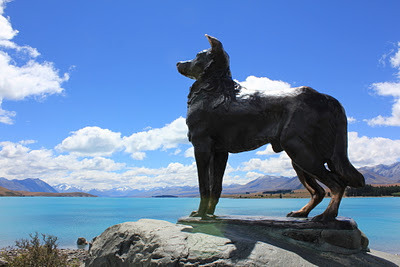 Lake Tekapo
Lake Tekapo
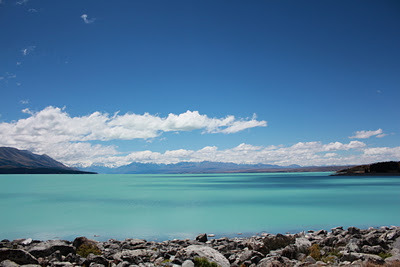 Lake Pukaki
Lake Pukaki
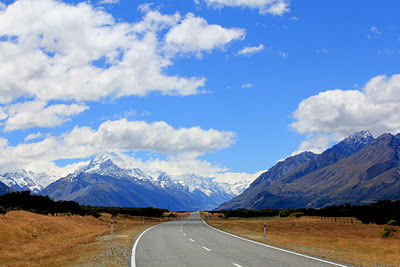 On the way to The Hermitage
On the way to The Hermitage
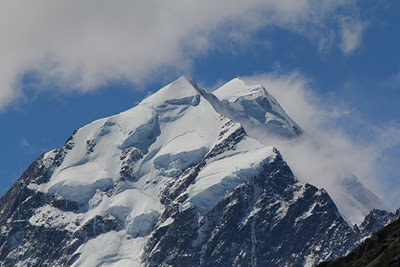 Aoraki/Mt Cook, south face
Aoraki/Mt Cook, south face
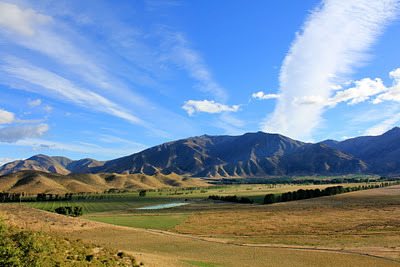 Waitaki Basin
Waitaki Basin
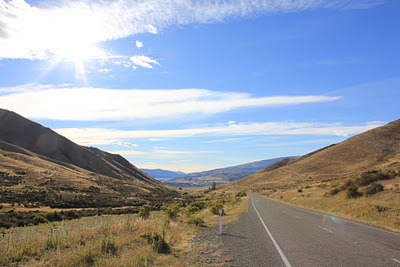 A glimpse of Lake Benmore
A glimpse of Lake Benmore
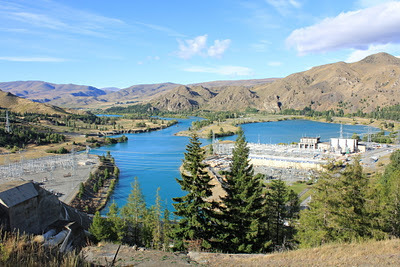 Benmore Hydro Station
Benmore Hydro Station
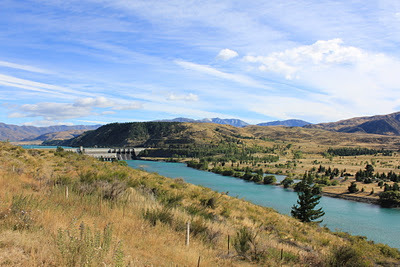 Aviemore Hydro Station
Aviemore Hydro Station
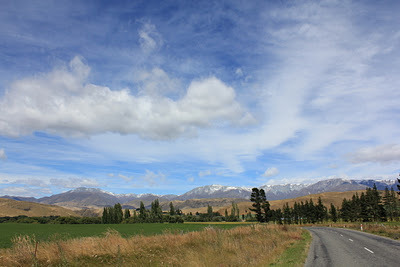 The road from Cattle Creek
The road from Cattle Creek
 Lake Tekapo
Lake Tekapo
 Lake Pukaki
Lake Pukaki
 On the way to The Hermitage
On the way to The Hermitage
 Aoraki/Mt Cook, south face
Aoraki/Mt Cook, south face
 Waitaki Basin
Waitaki Basin
 A glimpse of Lake Benmore
A glimpse of Lake Benmore
 Benmore Hydro Station
Benmore Hydro Station
 Aviemore Hydro Station
Aviemore Hydro Station
 The road from Cattle Creek
The road from Cattle Creek
Published on February 01, 2012 23:08
January 31, 2012
Research Roadtrip: Waimate
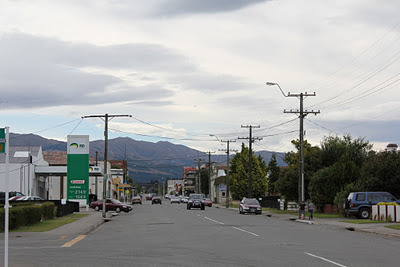
Waimate is a small town in South Canterbury, 20kms north of the Waitaki River. The population of the Waimate District (which encompasses Waimate and a number of other smaller towns) is around 7,000 people.
And while things mightn't be as bleak economically as in the 1980s, a walk around Waimate town will still yield a number of closed and boarded up buildings.
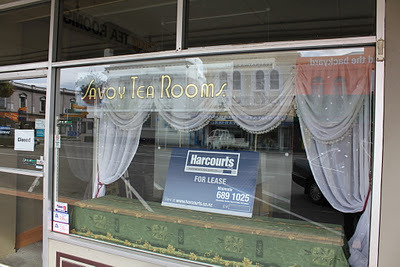 Tea Rooms: closed
Tea Rooms: closed
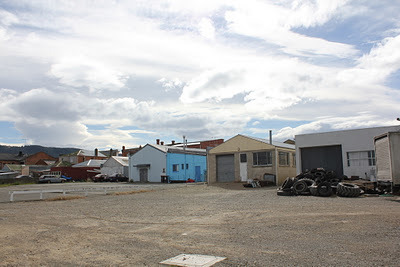 Back of the main street: barren
Back of the main street: barren
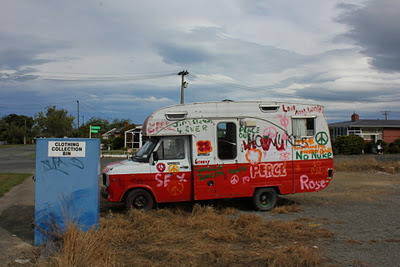 Mr Whippy: sprinkled with graffiti
Mr Whippy: sprinkled with graffitiMore about Waimate after the jump...
The main street does, however, have two second hand shops located opposite each other.
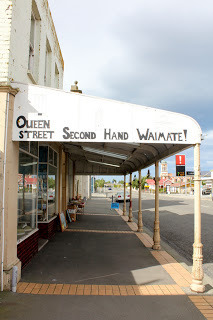
Second hand shops are never a good sign. The higher the percentage of second hand shops in your town, the more dire your situation. I swear, post-apocalypse it'll be all cockroaches and second hand stores.
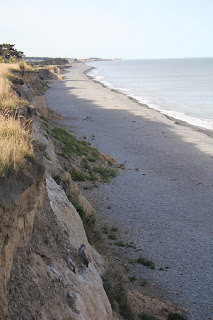 Cliffs/shags at St AndrewsThe reason I took the 7km detour off SH1 to visit Waimate is it's roughly halfway between Oamaru and Timaru. My fictional town of Marumaru South, which features in this story from Sport 38 and is a major setting in THE NOVEL, is located somewhere between these other –marus. But unlike Waitmate, Marumaru is located on the coast.
Cliffs/shags at St AndrewsThe reason I took the 7km detour off SH1 to visit Waimate is it's roughly halfway between Oamaru and Timaru. My fictional town of Marumaru South, which features in this story from Sport 38 and is a major setting in THE NOVEL, is located somewhere between these other –marus. But unlike Waitmate, Marumaru is located on the coast.Coastal aside: this particular stretch of coast, around the Waihao Box and Wainono Lagoon, is very difficult to access… It's either the crumbling, spotted shag-lined cliffs like at St Andrews, or the boggy paddocks, electric fences and wild rose embankments in the nameless farmland.
The inaccessibility was frustrating at the time, but it does mean I have some licence to plonk down whatever geographical features I want in THE NOVEL (within reason) as few people can dispute the picture I paint. So Marumaru looks a bit like Baring Head, which looks a lot like the southern side of the peninsula just south of Moeraki (I'm not sure what it's called), which is only 70-odd kms south of the mid-point between Oamaru and Timaru. Time for a breath.
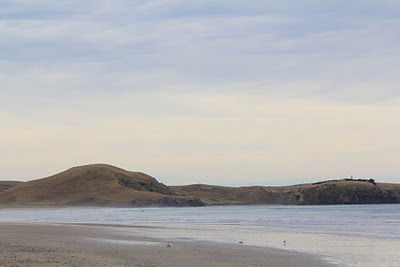
Anyway, back to Waimate. While its geography and history will differ from Marumaru, the town's present is very similar the present I envisaged in '30 Ways of Looking at Marumaru South' (and which continues to inform THE NOVEL).
Where Marumaru's former grandeur is embodied by its boarded up department stores, Waimate's biggest monument is St Patrick's Church. It dominates the entrance to town from the North and seems to be kept in good nick (I'm basing this on the exterior as it wasn't open for me to view inside the afternoon I visited).
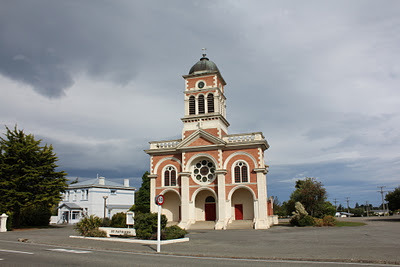
There were a number of other buildings which seemed loaded with significance greater than their uses (past and present). Perhaps it was just because I was walking round with a camera (locals were non-threatening and standoffish). Perhaps it was because I came looking for certain things, for what you might call architectural metonymies.
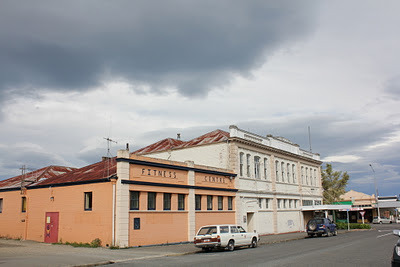
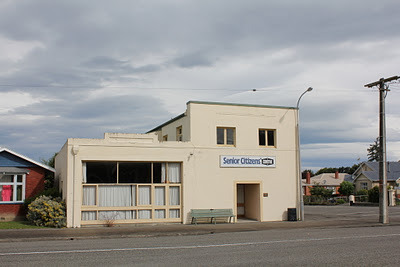
But I challenge anyone to look at the shell of the Arcadia Theatre (which actually started life as a shopping arcade; plans are afoot to renovate and reopen it as a theatre) and not be struck by it. Whether it makes you feel wistful, or mushy, or maudlin – it makes you feel.
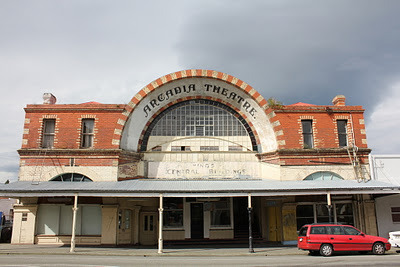
So, Waimate. I loved my time there.
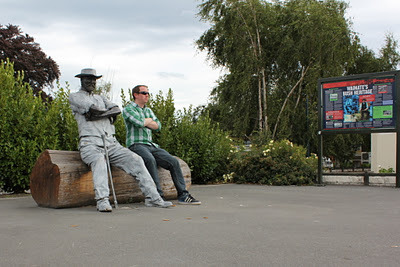
Published on January 31, 2012 22:43
January 30, 2012
Research Roadtrip: Urban coastal settlements
Okay, so on Thursday morning I flew into Dunedin, which really means I landed 40 minutes outta the city in Taieri. I then picked up my rental car and gunned it to Port Chalmers for a look around (this may or may not be the first landing point in NZ for one of the characters in THE NOVEL).
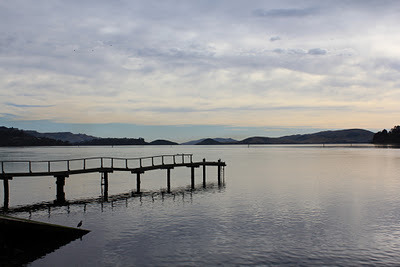 On the road to Port Chalmers
On the road to Port Chalmers
Port Chalmers still has a number of buildings from the 1800s, but they were overshadowed by two large cruise ships that were in port.
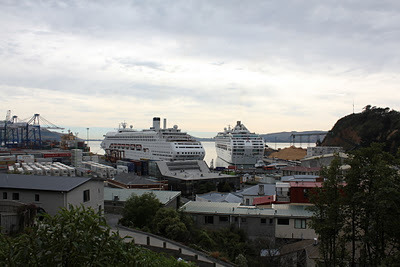 The scale of the present collides with the past, Port Chalmers
The scale of the present collides with the past, Port Chalmers
More about museums, Oamaru and Richie McCaw worship after the jump...
On Thursday I visited three museums in total (Port Chalmers Museum, Otago Museum in Dunedin and North Otago Museum in Oamaru) and a fourth on Friday morning (South Canterbury in Timaru). Port Chalmers was understandably small and filled a nautical niche. I was a bit disappointed by the size and content of the North Otago Museum, but the very informative 10 minute video at the i-site down the road went some way to make up for this.
The Otago Museum was fantastic for what it is, a kind of generalist, Te Papa-style museum with local and national flavoured permanent exhibits (there's a lot of stuffed birds and skeletons, which is a good thing in my opinion) and plenty of space for temporary exhibitions.
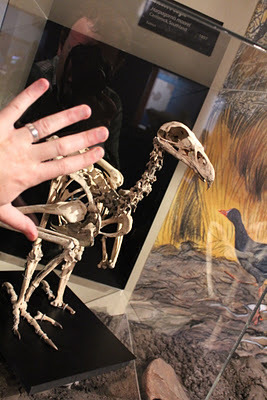 Haast's Eagle skeleton, Otago Museum
Haast's Eagle skeleton, Otago Museum
(I was surprised how small it looked, hence me shoving my hand in the photo for scale)The real surprise for me was the South Canterbury Museum. I'd camped overnight in Timaru (just in time to catch the southerly blast and get soaked in my porous tent) and was in two minds whether it was worth waiting around until the 10am opening time. But the museum has an extensive exhibit about life back in the day (ranging from early settlers up to the 1920s/30s), with lots of kitchen and laundry implements, oral history excerpts and other tidbits which are very useful for a manqué novelist trying to fudge his way through his historical sections.
Despite my museum experience, I greatly prefer Oamaru to Timaru. Oamaru is more dramatic by virtue of its compactness and those limestone buildings (the result of a quick population explosion, a lack of nearby timber but an abundance of stone, and the sudden decline of the town's fortunes in the 1900s which froze its Victorian centre in time for several years). Timaru is a nice place, don't get me wrong, but it's difficult to be inspired by it.
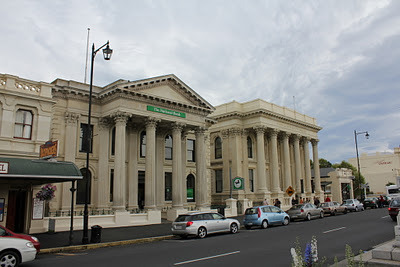 The current National Bank and former Bank of New South Wales, Thames St, Oamaru
The current National Bank and former Bank of New South Wales, Thames St, Oamaru
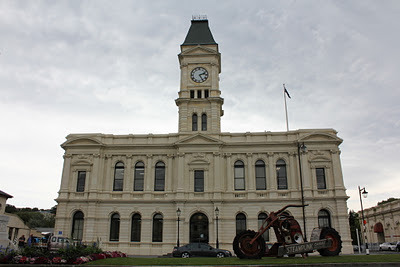 Old Post Office (now council building), and steampunk motorcycle
Old Post Office (now council building), and steampunk motorcycle
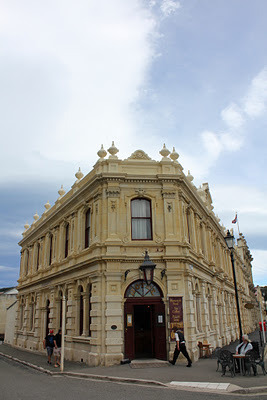 Criterion Hotel
Criterion Hotel
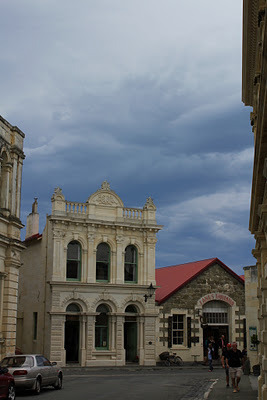 Looking towards Harbour St (note the front moving in)
Looking towards Harbour St (note the front moving in)
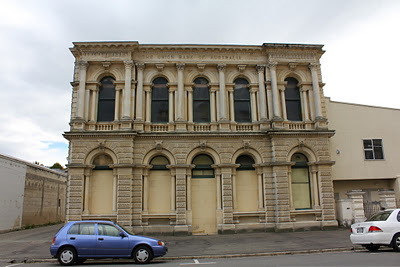 Union Bank of Australia Building (sadly blocked up)
Union Bank of Australia Building (sadly blocked up)
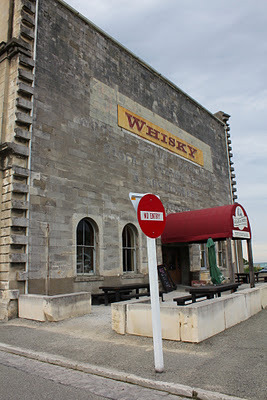 Whisky!
Whisky!
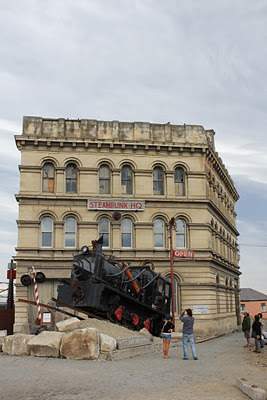 Steampunk HQ
Steampunk HQ
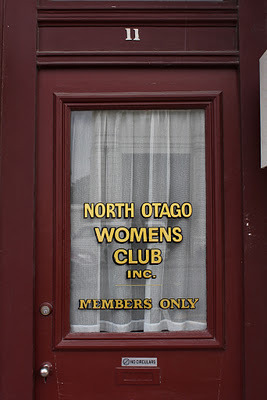 I took a photo of this door because I wanted to make a dick joke,
I took a photo of this door because I wanted to make a dick joke,
but now I've lost the nerve
One thing I'm not so keen on in and around Oamaru is the idol worship of Richie McCaw...
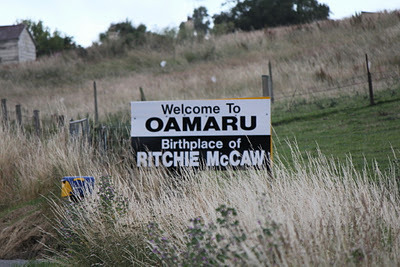
I mean, it's like he's dead or something.
And was playing for Kurow Under 13s really the start of his greatness?
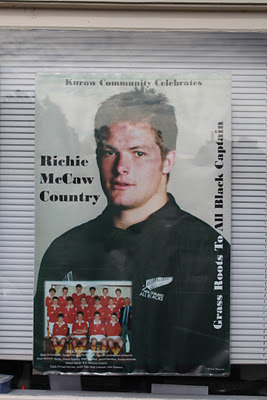
And this... thing, also in Kurow, baffles me.
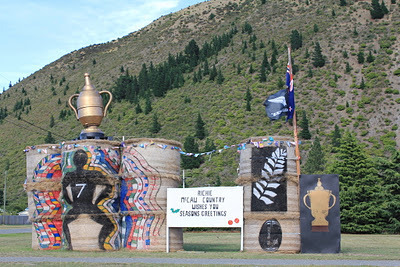
It's almost like he never moved to Christchurch...
 On the road to Port Chalmers
On the road to Port ChalmersPort Chalmers still has a number of buildings from the 1800s, but they were overshadowed by two large cruise ships that were in port.
 The scale of the present collides with the past, Port Chalmers
The scale of the present collides with the past, Port ChalmersMore about museums, Oamaru and Richie McCaw worship after the jump...
On Thursday I visited three museums in total (Port Chalmers Museum, Otago Museum in Dunedin and North Otago Museum in Oamaru) and a fourth on Friday morning (South Canterbury in Timaru). Port Chalmers was understandably small and filled a nautical niche. I was a bit disappointed by the size and content of the North Otago Museum, but the very informative 10 minute video at the i-site down the road went some way to make up for this.
The Otago Museum was fantastic for what it is, a kind of generalist, Te Papa-style museum with local and national flavoured permanent exhibits (there's a lot of stuffed birds and skeletons, which is a good thing in my opinion) and plenty of space for temporary exhibitions.
 Haast's Eagle skeleton, Otago Museum
Haast's Eagle skeleton, Otago Museum(I was surprised how small it looked, hence me shoving my hand in the photo for scale)The real surprise for me was the South Canterbury Museum. I'd camped overnight in Timaru (just in time to catch the southerly blast and get soaked in my porous tent) and was in two minds whether it was worth waiting around until the 10am opening time. But the museum has an extensive exhibit about life back in the day (ranging from early settlers up to the 1920s/30s), with lots of kitchen and laundry implements, oral history excerpts and other tidbits which are very useful for a manqué novelist trying to fudge his way through his historical sections.
Despite my museum experience, I greatly prefer Oamaru to Timaru. Oamaru is more dramatic by virtue of its compactness and those limestone buildings (the result of a quick population explosion, a lack of nearby timber but an abundance of stone, and the sudden decline of the town's fortunes in the 1900s which froze its Victorian centre in time for several years). Timaru is a nice place, don't get me wrong, but it's difficult to be inspired by it.
 The current National Bank and former Bank of New South Wales, Thames St, Oamaru
The current National Bank and former Bank of New South Wales, Thames St, Oamaru
 Old Post Office (now council building), and steampunk motorcycle
Old Post Office (now council building), and steampunk motorcycle Criterion Hotel
Criterion Hotel
 Looking towards Harbour St (note the front moving in)
Looking towards Harbour St (note the front moving in)
 Union Bank of Australia Building (sadly blocked up)
Union Bank of Australia Building (sadly blocked up)
 Whisky!
Whisky!
 Steampunk HQ
Steampunk HQ
 I took a photo of this door because I wanted to make a dick joke,
I took a photo of this door because I wanted to make a dick joke,but now I've lost the nerve
One thing I'm not so keen on in and around Oamaru is the idol worship of Richie McCaw...

I mean, it's like he's dead or something.
And was playing for Kurow Under 13s really the start of his greatness?

And this... thing, also in Kurow, baffles me.

It's almost like he never moved to Christchurch...
Published on January 30, 2012 23:25
There Will Be Birds
I'm back from my flying visit down south and it was faarking fantastic.
Rather than tackle it in one big post, I'll knock it off in several smaller, image-heavy posts over the next week or so. There will be birds. There will be lakes and hills and beaches. There will be more birds and a poorly-framed hector's dolphin. I will, however, spare you the roadkill wallaby I saw near Lake Aviemore.
But for now, here's a photo of my favourite mid-size town, the Steampunk Capital of New Zealand, Oamaru, as the southerly front approached on Thursday:
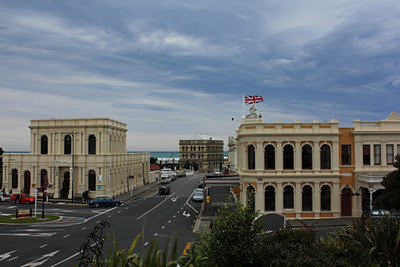

Rather than tackle it in one big post, I'll knock it off in several smaller, image-heavy posts over the next week or so. There will be birds. There will be lakes and hills and beaches. There will be more birds and a poorly-framed hector's dolphin. I will, however, spare you the roadkill wallaby I saw near Lake Aviemore.
But for now, here's a photo of my favourite mid-size town, the Steampunk Capital of New Zealand, Oamaru, as the southerly front approached on Thursday:

Published on January 30, 2012 00:23
January 25, 2012
Hills / Fielding / Bursitis / Work
A short poem
Topographical
The hills you know were made slowlyPushed up or carved out over centuriesFor the day you buy a bicycle.
Things I tell the Internet but might feel weird bringing up in general conversation #1
 My review of Chad Harbach's novel, The Art of Fielding, is in this weeks
Listener
.
My review of Chad Harbach's novel, The Art of Fielding, is in this weeks
Listener
.
This is my second paid book review. I enjoyed it slightly more than last time, but it's a time consuming way to make less than a hundred dollars after tax (read a 500 page novel then spend a day trying to say something substantial and useful in 400 words). I guess there's the free book thing, too.
My respect for good book critics continues to grow.
(I have an evolving fantasy of not writing any fiction in 2013 - or at least not working on a novel - and devoting myself to writing longform journalism. Just for shits and giggles. I'll snap out of it soon, I think).
Things I'd whinge about if you met me in person #1
I am suffering from bursitis at the mo. Specifically, olecranon bursitis, or 'student's elbow'. It's kinda hard to take a photo of my own elbow that does the freaky, deformed, bulbous, bruised thing justice, but here goes:
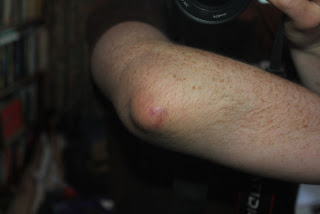
It was a lot worse yesterday: the size and hardness of a golf ball, which made bending the thing nearly impossible. It hurts a bit, but less than you might think.
I first munted by elbow while living in Edinburgh four years ago. Since then I've had about three recurrances, either from a substantial knock or too much leaning on my desk at work.
Is it just me, or does it feel weird to be talking about my elbow online?
Things I tell the Internet but might feel weird bringing up in general conversation #2
To the relief of my desk-averse elbow, I'm off tomorrow to North Otago/South Canterbury for a four day research mission. It'll be a mix of museum trawling, beach combing and hill climbing.
Not quite as adventurous as the events in THE NOVEL (thankfully), but should be fun. Here's the route I may or may not stick to:
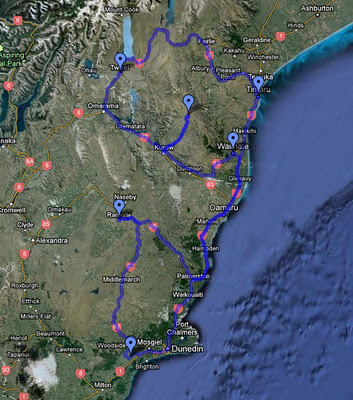
Photos to follow.
Something I'd whinge about if you met me in person and share online
I've gone up from two days a week at the Ministry of Education to three days. The logic behind the move went something like this:
• I've got up a head of steam on THE NOVEL (correction: I had up a head of steam, then got married)
• my (revised) deadline is not till July/August
• my team at work has just lost two people and they need all hands on deck
• $$$ I would earn more money $$$
• one of my working days could be a Friday, meaning I'd get to socialise more with colleagues (also: my brother/flatmate has Friday's off making it easier to be distracted at home on Fridays).
All solid reasons. I especially like the one with the $-signs. I also hoped that by increasing the scarcity of my writing time, I'd make better use of it.
It's still too early to say, but today I had a Gawd, what have I done? moment at work. It seems the holidays are finally over and there are a dozen things that need to be done pronto. Doesn't help that the last few weeks have been slow going with THE NOVEL.
There is no perfect day job/writing mix and I'm sure I'll get comfortable with my 3/2 mix at some stage.
Another short poem
Out of doors
It's so late the weather has disappeared.The trees have regained their good posture.Where has Wellington gone I wonder?
Topographical
The hills you know were made slowlyPushed up or carved out over centuriesFor the day you buy a bicycle.
Things I tell the Internet but might feel weird bringing up in general conversation #1
 My review of Chad Harbach's novel, The Art of Fielding, is in this weeks
Listener
.
My review of Chad Harbach's novel, The Art of Fielding, is in this weeks
Listener
.This is my second paid book review. I enjoyed it slightly more than last time, but it's a time consuming way to make less than a hundred dollars after tax (read a 500 page novel then spend a day trying to say something substantial and useful in 400 words). I guess there's the free book thing, too.
My respect for good book critics continues to grow.
(I have an evolving fantasy of not writing any fiction in 2013 - or at least not working on a novel - and devoting myself to writing longform journalism. Just for shits and giggles. I'll snap out of it soon, I think).
Things I'd whinge about if you met me in person #1
I am suffering from bursitis at the mo. Specifically, olecranon bursitis, or 'student's elbow'. It's kinda hard to take a photo of my own elbow that does the freaky, deformed, bulbous, bruised thing justice, but here goes:

It was a lot worse yesterday: the size and hardness of a golf ball, which made bending the thing nearly impossible. It hurts a bit, but less than you might think.
I first munted by elbow while living in Edinburgh four years ago. Since then I've had about three recurrances, either from a substantial knock or too much leaning on my desk at work.
Is it just me, or does it feel weird to be talking about my elbow online?
Things I tell the Internet but might feel weird bringing up in general conversation #2
To the relief of my desk-averse elbow, I'm off tomorrow to North Otago/South Canterbury for a four day research mission. It'll be a mix of museum trawling, beach combing and hill climbing.
Not quite as adventurous as the events in THE NOVEL (thankfully), but should be fun. Here's the route I may or may not stick to:

Photos to follow.
Something I'd whinge about if you met me in person and share online
I've gone up from two days a week at the Ministry of Education to three days. The logic behind the move went something like this:
• I've got up a head of steam on THE NOVEL (correction: I had up a head of steam, then got married)
• my (revised) deadline is not till July/August
• my team at work has just lost two people and they need all hands on deck
• $$$ I would earn more money $$$
• one of my working days could be a Friday, meaning I'd get to socialise more with colleagues (also: my brother/flatmate has Friday's off making it easier to be distracted at home on Fridays).
All solid reasons. I especially like the one with the $-signs. I also hoped that by increasing the scarcity of my writing time, I'd make better use of it.
It's still too early to say, but today I had a Gawd, what have I done? moment at work. It seems the holidays are finally over and there are a dozen things that need to be done pronto. Doesn't help that the last few weeks have been slow going with THE NOVEL.
There is no perfect day job/writing mix and I'm sure I'll get comfortable with my 3/2 mix at some stage.
Another short poem
Out of doors
It's so late the weather has disappeared.The trees have regained their good posture.Where has Wellington gone I wonder?
Published on January 25, 2012 00:27
January 15, 2012
A trip to Marumaru South, aka Baring Head
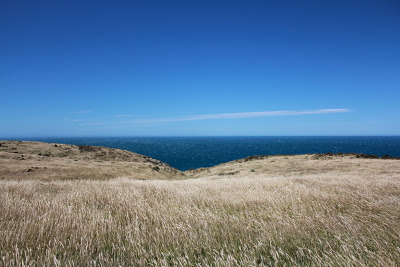
I can see Baring Head from my deck (I could see it from my desk right now if another house didn't intercede) but the view is particularly good when I'm walking home from the bus stop on a summer evening. Over the course of several such evenings two years ago I decided my fictional town of Marumaru South, located somewhere between Timaru and Oamaru, would actually look a lot like Baring Head, but with houses and streets.
Despite it seeming so close from the top of Mt Albert, Baring Head is actually an hour's drive from my house, followed by an hour's walk to reach the lighthouse and the views back across the harbour. And despite working on a novel set in Marumaru South for the last year, I had never actually been to Baring Head until today.
Before starting the walk to the lighthouse, M. and I drove to the coast, near the mouth of the Wainuiomata River. From the beach you can actually see the lighthouse and the hills you have to climb over to look back at Wellington.
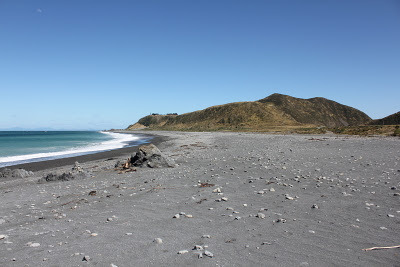
After traipsing through sheep paddocks following the occasional orange triangle that marked the path, we made it up the hill and I was able to take the reverse of the photo above:
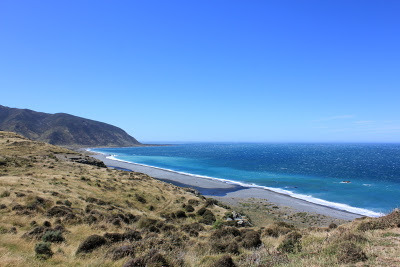
Baring Head is the windiest place in New Zealand, and it didn't disappoint today. Luckily the sun was out so it wasn't too cold. The sun, the wind, the pulsing grass in seed, the rocks and white-capped sea - it was all quite dramatic. Oh, and the sheep!
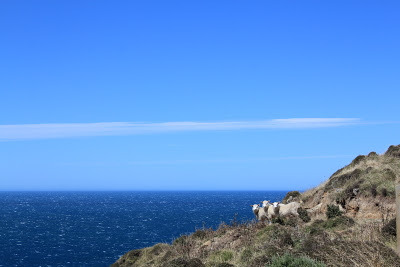
I'm not into lighthouses like some people (*cough* Marcus Lush *cough*), but there's a lighthouse in my fictional town and I was interested to see what Baring Head's lighthouse looked like up close.
Aside: I know I risk sounding a lot like the novelist in this article from the Onion:
According to Milligan, he spent seven months conducting in-depth historical research in order to conjure, as if out of thin air, the fictional and entirely bullshit universe of Connor's Cove, Massachusetts, including its utterly uninspired lighthouse...I guess this is as close to operating on a knife-edge as we historical novelists get, eh?
Anyway, the Baring Head lighthouse (built 1935, so too recent to be much use to me) is a concrete design similar to the one at Cape Reinga, which I saw last month in almost zero visibility; you couldn't see the sea at all). Sadly there's a few temporary NIWA buildings behind the Baring Head lighthouse which ruin any lighthouse + sea photos.
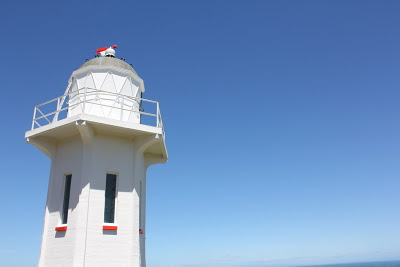 Baring Head lightouse + sky - sea - NIWA weather stationBack from the lighthouse there are three boarded up cottages and another few small sheds/outhouses. The lawns had all been freshly mown giving the place a recent viral epidemic vibe.
Baring Head lightouse + sky - sea - NIWA weather stationBack from the lighthouse there are three boarded up cottages and another few small sheds/outhouses. The lawns had all been freshly mown giving the place a recent viral epidemic vibe.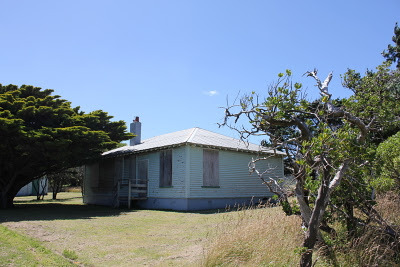
Continuing on the loop walk yielded some great views of Wellington Harbour. Thanks to my zoom lens and some more digital zooming at home I've been able to identify my flat in some photos, but you'll just have to trust me.
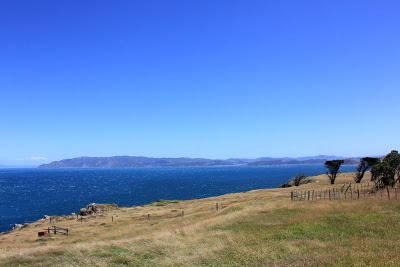 Looking toward Wellington from Baring HeadSo, how did my trip to Baring Head affect my thinking about Marumaru South? Well, I think there'll be more wind when I go through and do the second draft.
Looking toward Wellington from Baring HeadSo, how did my trip to Baring Head affect my thinking about Marumaru South? Well, I think there'll be more wind when I go through and do the second draft. I'm holding off on any other changes as I'm going down to South Canterbury and North Otago in a fortnight for a four day research trip. It'll inform both my Marumaru scenes and the later 'flight to the hills'.
But for now, my trip to the real Marumaru has given my motivation to work on THE NOVEL a nice fillip. And who knows, maybe the exercise and new environment stimulated a bit of neurogenesis...
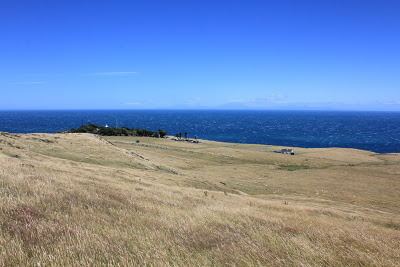
Published on January 15, 2012 00:49
January 10, 2012
Short poems / Krypton Factor / Neurogenesis
Short Poems
2012 is the year of the London Olympics. It is also the Alan Turing Year and the year the world might end.
But I'm calling it the Year of the Short Poem. I'm not sure why. I just wanna post some short (six or less lines) poems in my blog posts this year.
So here's #1 (it's by me, by the way):
To the Burnham Army Base! (and don't forget your tracksuit)
There's was a minor internet kerfuffle earlier this week over a pamphlet from an indeterminate date in which John Key appears to diss New Zealand writers, which is all the more baffling as the pamphlet is supposed to spruik a NZ literature walk. Here's the full statement (source: Listener Online).
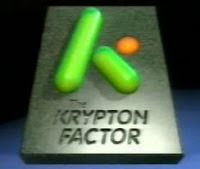 It's probably true that for the majority of the population an average all black will be held in higher esteem than a great writer. But why bring up the All Blacks at all, John (or whoever in the PM's office wrote his statement)?
It's probably true that for the majority of the population an average all black will be held in higher esteem than a great writer. But why bring up the All Blacks at all, John (or whoever in the PM's office wrote his statement)?
Without presuming to being a literary hero, the statement does tempt me to organise a team of writers together to challenge the All Blacks to a Krypton Factor-style battle of brains and brawn.
Does anyone have Dougal Stevenson's phone number?
Ghastly ghastly grows the purple blight
Around this time last year I wrote a column in the Dom Post about my hatred of agapanthus. I was pleased, therefore, to see this article online today (any discussion about the evil, ugly, insipid plant is helpful) but dismayed that the early poll results weren't heavily in favour of banning it.
Maybe if an All Black spoke out against agapanthus??
Double Jeopardy
Something I missed while travelling: A Man Melting has the unusual privilege of being on the Sunday Star Times' 2010 and 2011 lists of best books. The original December 4 2011 article not available online but the list features on Chch City Libraries' website.
Here's what the article had to say about AMM: "The year's most outstanding debut. Assured stories from a young writer who knows how to vary his style to suit his subject: ranges from comedy to the really dour."
Kinda shows how small a splash AMM made in 2010, eh? The same can probably be said for 2011, but it's hard to see how it can make it three years in a row in 2012… maybe an expanded third edition??
Caged monkey, sad monkey. Free monkey, happy monkey.
My current audiobook is Proust was a Neuroscientist by Jonah Lehrer. It looks at how famous writers and artists anticipated scientific discoveries, such as Whitman's belief that emotions belonged both to the mind and body. The connections between artist and science seems a bit tangiential at times, but the discussion of the science of umami (the fifth taste) or neurogenesis is facinating.
The connections between artist and science seems a bit tangiential at times, but the discussion of the science of umami (the fifth taste) or neurogenesis is facinating.
On the topic of neurogenesis, Lehrer describes how for a long time science held that the number of neurons in a primate's brain was capped from infancy. But eventually experiemental science could demonstrate that our neurons could indeed divide and thus create new neurons. Part of the problem was that the lab tests used captive monkeys, and it has since been proven that captivity is bad for creating new neurons (neurogenesis). If you take the monkeys out of their cages, make them search for their food and give them a variety of toys, suddenly the brain starts bubbling with new neurons.
It has also been shown, so Lehrer informs me, that some anti-depressants stimulate neurongenesis and it is believed that new neurons rather than increased ceratonin could be what is making patients happy.
Combining these two findings suggests that the secret to happiness is a varied and challenging environment that'll stimulate neurogenesis. Which provides a neurological explanation for why travel can make us happy. It can also explain why certain subjects (e.g. me) become maudlin when stuck in an office with little to do (or doing little despite a number of things they could be doing).
Now, if only summer will arrive properly, I'll commence my neurogenesis routine!
The year of the first person
I have two shortish (but not short-short) poems in Turbine 2011, which came out while I was roadtripping. And no, I'm not trying to start a new vogue for first person bio notes, this is just what I sent along with my initial submission (as in: "Hey, here are some poems and here's a bit about me"). I never got asked for a proper bio note or got a chance to review this one, but I'm happy to let it stand.
Maybe 2012 can also be the year of the first person? Or does that sound too Biblical?
2012 is the year of the London Olympics. It is also the Alan Turing Year and the year the world might end.
But I'm calling it the Year of the Short Poem. I'm not sure why. I just wanna post some short (six or less lines) poems in my blog posts this year.
So here's #1 (it's by me, by the way):
Youth
Children play on the floor.
The mothers are beautiful.
We negotiate the years, barbeque by barbeque.
To the Burnham Army Base! (and don't forget your tracksuit)
There's was a minor internet kerfuffle earlier this week over a pamphlet from an indeterminate date in which John Key appears to diss New Zealand writers, which is all the more baffling as the pamphlet is supposed to spruik a NZ literature walk. Here's the full statement (source: Listener Online).
I have always believed we should enhance the literary skills of our young people and while our literary heroes may never challenge the glory and respect given to our All Blacks, we still need role models to inspire us.Erm. Okay.
This Literary Heritage Trail celebrates writers, poets and playwrights who have contributed to this young country's cultural and historical life.
I hope you will take the opportunity to be part of this journey.
- Hon. John Key, Prime Minister of New Zealand.
 It's probably true that for the majority of the population an average all black will be held in higher esteem than a great writer. But why bring up the All Blacks at all, John (or whoever in the PM's office wrote his statement)?
It's probably true that for the majority of the population an average all black will be held in higher esteem than a great writer. But why bring up the All Blacks at all, John (or whoever in the PM's office wrote his statement)? Without presuming to being a literary hero, the statement does tempt me to organise a team of writers together to challenge the All Blacks to a Krypton Factor-style battle of brains and brawn.
Does anyone have Dougal Stevenson's phone number?
Ghastly ghastly grows the purple blight
Around this time last year I wrote a column in the Dom Post about my hatred of agapanthus. I was pleased, therefore, to see this article online today (any discussion about the evil, ugly, insipid plant is helpful) but dismayed that the early poll results weren't heavily in favour of banning it.
Maybe if an All Black spoke out against agapanthus??
Double Jeopardy
Something I missed while travelling: A Man Melting has the unusual privilege of being on the Sunday Star Times' 2010 and 2011 lists of best books. The original December 4 2011 article not available online but the list features on Chch City Libraries' website.
Here's what the article had to say about AMM: "The year's most outstanding debut. Assured stories from a young writer who knows how to vary his style to suit his subject: ranges from comedy to the really dour."
Kinda shows how small a splash AMM made in 2010, eh? The same can probably be said for 2011, but it's hard to see how it can make it three years in a row in 2012… maybe an expanded third edition??
Caged monkey, sad monkey. Free monkey, happy monkey.
My current audiobook is Proust was a Neuroscientist by Jonah Lehrer. It looks at how famous writers and artists anticipated scientific discoveries, such as Whitman's belief that emotions belonged both to the mind and body.
 The connections between artist and science seems a bit tangiential at times, but the discussion of the science of umami (the fifth taste) or neurogenesis is facinating.
The connections between artist and science seems a bit tangiential at times, but the discussion of the science of umami (the fifth taste) or neurogenesis is facinating.On the topic of neurogenesis, Lehrer describes how for a long time science held that the number of neurons in a primate's brain was capped from infancy. But eventually experiemental science could demonstrate that our neurons could indeed divide and thus create new neurons. Part of the problem was that the lab tests used captive monkeys, and it has since been proven that captivity is bad for creating new neurons (neurogenesis). If you take the monkeys out of their cages, make them search for their food and give them a variety of toys, suddenly the brain starts bubbling with new neurons.
It has also been shown, so Lehrer informs me, that some anti-depressants stimulate neurongenesis and it is believed that new neurons rather than increased ceratonin could be what is making patients happy.
Combining these two findings suggests that the secret to happiness is a varied and challenging environment that'll stimulate neurogenesis. Which provides a neurological explanation for why travel can make us happy. It can also explain why certain subjects (e.g. me) become maudlin when stuck in an office with little to do (or doing little despite a number of things they could be doing).
Now, if only summer will arrive properly, I'll commence my neurogenesis routine!
The year of the first person
I have two shortish (but not short-short) poems in Turbine 2011, which came out while I was roadtripping. And no, I'm not trying to start a new vogue for first person bio notes, this is just what I sent along with my initial submission (as in: "Hey, here are some poems and here's a bit about me"). I never got asked for a proper bio note or got a chance to review this one, but I'm happy to let it stand.
Maybe 2012 can also be the year of the first person? Or does that sound too Biblical?
Published on January 10, 2012 10:49
January 4, 2012
The Best Books I Read in 2011
I know it's already five days into the new year, but here are the best books I read in 2011. As with my previous lists (2010, 2008), these books represent my best reading experiences of the year regardless of when they were published (for the record I read 13 books published in 2011 with three making my top ten).
1. Nicholas Nickleby by Charles Dickens(novel, audiobook,1838-9)

I mentioned this book several times this year (such as here,here and here); perhaps this is natural when you listen to something for 30 hours...
What I said about it in October: "I can't remember laughing out loud this much when listening to an audiobook... M. is also listening to the audiobook on her iPod, though she's about ten hours behind me. We talk about the detours into the lives of the Kenwigses and the Crumleses, the lesser villians like Wackford Squeers and Ralph Nickleby and the novel's great villain, Mrs Nickleby. It's all great fun, but is it great fiction?I think so. It's too flabby by modern standards. Far too many adverbs... But it's a pleasure to spend thirty hours of bus journeys and waterfront walks with Dickens' narrator (and Robert Whitfield, the audiobook's 'narrator').The question is, what can I possibly load on my iPod next that'll be this much fun?"
2. The Prestige by Christopher Guest
(novel, audiobook,1995)
 Sometimes you read the right book at the right time, or inthis case, you listen to it at the right time.
Sometimes you read the right book at the right time, or inthis case, you listen to it at the right time.
What I said about it in March: "Where Priest's novel trumps [Christopher Nolan's 2006 film adaptation] is the degree to which magic is inextricable from the story. The diary of Alfred Borden is built upon the concept of "the pledge" - the idea that the magician shows you what is up his sleeve, and you are willing to believe there's nothing, and that when something is produced hence, it is magic. So too, the writing of the diary exists on two levels: there's the prima facie truth and the between-the-lines truth... Great stuff."
3. A Visit From The Goon Squad by Jennifer Egan
(novel or linked short story collection - your call,2010)

What I said about it in July: "A Visit From The Goon Squad is about connections and disconnections, and the diffuse structure and disjointed narrative are how this is conveyed. Setting it in and around the music industry, which has always been fickle but over the last twenty years has seen drastic changes on the corporate side, the distribution and consumption of music, is genius.
"By the time I closed the book I had an appreciation for it, a respect even, and suspect it may creep onto my top ten list for books I've read this year...
"But it was a book I hated at several points."
You'll have to read the whole post to see what I hated, but it appears the passing of time has allowed it to more than creep into my top ten.
4. The Thousand Autumns of Jacob de Zoet by David Mitchell
(novel,2010)

A real highlight for me in 2011 was my trip to Sydney in May the Commonwealth Writers Prize/Sydney Writers Festival and getting to hang out with some truly talent writers, including one Mr David Mitchell.
What I said about his book in April: "The Thousand Autumns of Jacob de Zoet is both a leap back to the ambitious, imaginative feats of Mitchell's Cloud Atlas days, and a continuation of the use of more linear and focussed plots exhibited in Black Swan Green...
"There is still some unevenness in this novel... but one can overlook a couple of odd pages out when the novel is as entertaining and transporting as 1000 Autumns."
5. 99 Ways Into New Zealand Poetry by Paula Green and HarryRicketts
(poetry/non-fiction, 2009)

I mentioned that I was reading this excellent book a few times throughout the year, but never summarised my thoughts because it's hard to feel like you've finished such a book. Green and Ricketts have sliced poetry up into various genres and movements and provided a chapter for each teeming with examples and places where to look next. A truly valuable introduction to poetry and New Zealand poetry that also functions like a Amazon-style 'If you liked this, you'll like...' set of recommendations for those who've read more widely but still have some gaps.
Special mention here to Harvey McQueen's anthology of New Zealand poems These I have loved (2010), which served both to bring new poems to my attention and remind me that I actually did read, study and enjoy New Zealand poetry at high school (early James K Baxter in particular, which I'd written off as imitative and easy to teach, but this is far too harsh a verdict for the likes of 'Wild Bees').
6. Tall Ships: The Golden Age of Sail by Phillip McCutchan
(non-fiction, 1976)
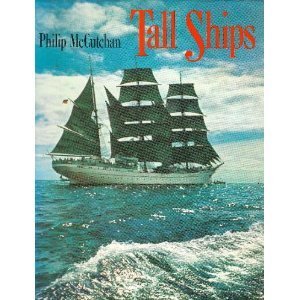
Sometimes you read the right book at not quite the righttime, but still time enough for it to be of use...
What I said about it in November: "Since [buying the booktwo years ago] I've read over a dozen books about sailing ships and leftMcCutchan's languishing on the shelf. Sigh. I could have saved myself so muchtime leafing through books that weren't quite right."
Do I think you should all rush out and buy a copy? No (even if it were that easy to find a 36 year old book). It's a niche interest. But in a year full of non-fiction reading and research, it stands head and shoulders above the others in terms of my reading experience.
7. The Larnachs by Owen Marshall
(novel, 2011)

The first New Zealand fiction to appear on the list. All up I read ten books of fiction (novels and story collections) by New Zealand writers, after reading nine last year. While there were moments of great promise (Wulf) and polish (From Under the Overcoat, The Trouble With Fire) in other books, Marshall's novel was the most impressive for me.
What I said about it in October: "This is a marvellously written book. Marshall's fiction has often employed a formal register, though this is his first attempt at an historical novel. The delight he has taken in the polished grammar of this bygone era is evident. I often read a sentence and paused to imagine Owen Marshall leaning back on his office chair, grinning, having just crafted it."
8. The Sense of an Ending by Julian Barnes
(novel,audiobook, 2011)

It's a rare Booker winner that makes it onto my top ten...
What I said about it in November: "The Sense of an Ending worked magnificently as an audiobook. There's a single narrator, Tony Webster, who recalls specific moments in his life relating to a particular strand of memory: those relating to his friend, Adrian, who committed suicide in his early twenties. Tony weaves in and out of memory, digressing often on just what memory is and how it changes with time, but also finds the time to muse about the modern world, retirement, divorce and self-delusion. This is the kind of novel some agents might describe as quiet or slow, if you were to query them as a no-name writer, but I found it a thrilling and engaging story – thrilling, I guess, because it felt so intimate and real."
9. Freedom by Jonathan Franzen (novel, 2010)

At the other end of the spectrum from Barnes' slight novel is Franzen's ambitious, self-important doorstop.
What I said about it in May: "... it took me a good while to get sucked into the narrative – in fact, I thought about giving up after 50 pages and again at 100. Ah, at least I finished The Corrections...
"It's clear J-Franz has it, whatever it is we're all looking for in our writers: cajones, verbal alacrity and something to say, a deep moral vein and a finger on the pulse of kids these days... but there's always the push and pull of his fiction and his FICTION, of the story he's telling and the book he's writing, of the look at my characters and the look at me.
I went on to call it a good-to-great novel and a sure bet to make my 2011 top ten. Seems it just squeezed in.
10= Western Line by Airini Beautrais andSpark by Emma Neale
(poetry, 2011 and 2008)


I read twelve collections of poetry in 2011, which comes to one a month. No doubt I could and should have read more, but the cream of this year's crop were Beautrais' second and Neale's third collections.
I enjoyed Beautrais' collection of prose poems, Secret Heart, about as much as I can imagine enjoying such a book (don't get me wrong, I love a good prose poem, but find myself maxed out after half a dozen), but Western Line manages to keep that 'An odd thing I noticed today' feel while wielding ancient forms of poetry (curses, charms, love poems) with modern aloofness.
What stands out for me in Neale's collection in the crispness of voice. There are a lot of poems (and prose-y bits) about preganancy and motherhood, which in years gone by or in the hands of another poet might have left me completely untouched, but Neale manages to present her 'Odd baby things I noticed today' in such vivid and seemingly simple ways that I went along for the ride and enjoyed it.
*
Some other statistics:
In 2010 42% of the books I read were New Zealand books. In 2011 this dropped slightly to 40%. Anything between a third and a half sounds about right. Any less and you're either missing new books that come out or aren't chipping away at those classics you'll read one day. Any more and you risk become too cloistered in your reading.
I listened to 10 audiobooks, which is down from previous years, but when you consider I listened to both The Brothers Karamazov and Nicholas Nickleby, both very long books, I think I did okay. It's interesting to note that my top two this year were both audiobooks. I think after several years of listening and reading to books, the distinction between the two is now quite small.
I read one eBook on my iPad, Jack London's Call of the Wild. I have downloaded a bunch more, but there always seems to be other things to do with the devise besides reading Chekhov. Gimme paper, I say.
Finally, I read nine short story collections to 26 six novels, or roughly one short story collection for every three novels. In 2010 this ratio was slightly higher (13:21).
*
Reading targets for 2012
First, an excuse. I have to read between 120 and 160 short stories as a judge of the Commonwealth Short Story Prize between now and May. This is something like 5 to 7 books worth. And while this won't be the same as reading for leisure, I'll surely eat up some of my leisure reading time.
But here are four targets which I'll report back on at the end of the year:
Read 12 poetry collections (one a month): hopefully there's a new Geoff Cochrane collection coming out around Writers and Readers Week like in '09!!.Listen to 12 audiobooks, including at least four non-fiction books.Read at least twenty New Zealand books.Read at least six Australian books of fiction.Read at least six books I already own.
1. Nicholas Nickleby by Charles Dickens(novel, audiobook,1838-9)

I mentioned this book several times this year (such as here,here and here); perhaps this is natural when you listen to something for 30 hours...
What I said about it in October: "I can't remember laughing out loud this much when listening to an audiobook... M. is also listening to the audiobook on her iPod, though she's about ten hours behind me. We talk about the detours into the lives of the Kenwigses and the Crumleses, the lesser villians like Wackford Squeers and Ralph Nickleby and the novel's great villain, Mrs Nickleby. It's all great fun, but is it great fiction?I think so. It's too flabby by modern standards. Far too many adverbs... But it's a pleasure to spend thirty hours of bus journeys and waterfront walks with Dickens' narrator (and Robert Whitfield, the audiobook's 'narrator').The question is, what can I possibly load on my iPod next that'll be this much fun?"
2. The Prestige by Christopher Guest
(novel, audiobook,1995)
 Sometimes you read the right book at the right time, or inthis case, you listen to it at the right time.
Sometimes you read the right book at the right time, or inthis case, you listen to it at the right time.What I said about it in March: "Where Priest's novel trumps [Christopher Nolan's 2006 film adaptation] is the degree to which magic is inextricable from the story. The diary of Alfred Borden is built upon the concept of "the pledge" - the idea that the magician shows you what is up his sleeve, and you are willing to believe there's nothing, and that when something is produced hence, it is magic. So too, the writing of the diary exists on two levels: there's the prima facie truth and the between-the-lines truth... Great stuff."
3. A Visit From The Goon Squad by Jennifer Egan
(novel or linked short story collection - your call,2010)

What I said about it in July: "A Visit From The Goon Squad is about connections and disconnections, and the diffuse structure and disjointed narrative are how this is conveyed. Setting it in and around the music industry, which has always been fickle but over the last twenty years has seen drastic changes on the corporate side, the distribution and consumption of music, is genius.
"By the time I closed the book I had an appreciation for it, a respect even, and suspect it may creep onto my top ten list for books I've read this year...
"But it was a book I hated at several points."
You'll have to read the whole post to see what I hated, but it appears the passing of time has allowed it to more than creep into my top ten.
4. The Thousand Autumns of Jacob de Zoet by David Mitchell
(novel,2010)

A real highlight for me in 2011 was my trip to Sydney in May the Commonwealth Writers Prize/Sydney Writers Festival and getting to hang out with some truly talent writers, including one Mr David Mitchell.
What I said about his book in April: "The Thousand Autumns of Jacob de Zoet is both a leap back to the ambitious, imaginative feats of Mitchell's Cloud Atlas days, and a continuation of the use of more linear and focussed plots exhibited in Black Swan Green...
"There is still some unevenness in this novel... but one can overlook a couple of odd pages out when the novel is as entertaining and transporting as 1000 Autumns."
5. 99 Ways Into New Zealand Poetry by Paula Green and HarryRicketts
(poetry/non-fiction, 2009)

I mentioned that I was reading this excellent book a few times throughout the year, but never summarised my thoughts because it's hard to feel like you've finished such a book. Green and Ricketts have sliced poetry up into various genres and movements and provided a chapter for each teeming with examples and places where to look next. A truly valuable introduction to poetry and New Zealand poetry that also functions like a Amazon-style 'If you liked this, you'll like...' set of recommendations for those who've read more widely but still have some gaps.
Special mention here to Harvey McQueen's anthology of New Zealand poems These I have loved (2010), which served both to bring new poems to my attention and remind me that I actually did read, study and enjoy New Zealand poetry at high school (early James K Baxter in particular, which I'd written off as imitative and easy to teach, but this is far too harsh a verdict for the likes of 'Wild Bees').
6. Tall Ships: The Golden Age of Sail by Phillip McCutchan
(non-fiction, 1976)

Sometimes you read the right book at not quite the righttime, but still time enough for it to be of use...
What I said about it in November: "Since [buying the booktwo years ago] I've read over a dozen books about sailing ships and leftMcCutchan's languishing on the shelf. Sigh. I could have saved myself so muchtime leafing through books that weren't quite right."
Do I think you should all rush out and buy a copy? No (even if it were that easy to find a 36 year old book). It's a niche interest. But in a year full of non-fiction reading and research, it stands head and shoulders above the others in terms of my reading experience.
7. The Larnachs by Owen Marshall
(novel, 2011)

The first New Zealand fiction to appear on the list. All up I read ten books of fiction (novels and story collections) by New Zealand writers, after reading nine last year. While there were moments of great promise (Wulf) and polish (From Under the Overcoat, The Trouble With Fire) in other books, Marshall's novel was the most impressive for me.
What I said about it in October: "This is a marvellously written book. Marshall's fiction has often employed a formal register, though this is his first attempt at an historical novel. The delight he has taken in the polished grammar of this bygone era is evident. I often read a sentence and paused to imagine Owen Marshall leaning back on his office chair, grinning, having just crafted it."
8. The Sense of an Ending by Julian Barnes
(novel,audiobook, 2011)

It's a rare Booker winner that makes it onto my top ten...
What I said about it in November: "The Sense of an Ending worked magnificently as an audiobook. There's a single narrator, Tony Webster, who recalls specific moments in his life relating to a particular strand of memory: those relating to his friend, Adrian, who committed suicide in his early twenties. Tony weaves in and out of memory, digressing often on just what memory is and how it changes with time, but also finds the time to muse about the modern world, retirement, divorce and self-delusion. This is the kind of novel some agents might describe as quiet or slow, if you were to query them as a no-name writer, but I found it a thrilling and engaging story – thrilling, I guess, because it felt so intimate and real."
9. Freedom by Jonathan Franzen (novel, 2010)

At the other end of the spectrum from Barnes' slight novel is Franzen's ambitious, self-important doorstop.
What I said about it in May: "... it took me a good while to get sucked into the narrative – in fact, I thought about giving up after 50 pages and again at 100. Ah, at least I finished The Corrections...
"It's clear J-Franz has it, whatever it is we're all looking for in our writers: cajones, verbal alacrity and something to say, a deep moral vein and a finger on the pulse of kids these days... but there's always the push and pull of his fiction and his FICTION, of the story he's telling and the book he's writing, of the look at my characters and the look at me.
I went on to call it a good-to-great novel and a sure bet to make my 2011 top ten. Seems it just squeezed in.
10= Western Line by Airini Beautrais andSpark by Emma Neale
(poetry, 2011 and 2008)


I read twelve collections of poetry in 2011, which comes to one a month. No doubt I could and should have read more, but the cream of this year's crop were Beautrais' second and Neale's third collections.
I enjoyed Beautrais' collection of prose poems, Secret Heart, about as much as I can imagine enjoying such a book (don't get me wrong, I love a good prose poem, but find myself maxed out after half a dozen), but Western Line manages to keep that 'An odd thing I noticed today' feel while wielding ancient forms of poetry (curses, charms, love poems) with modern aloofness.
What stands out for me in Neale's collection in the crispness of voice. There are a lot of poems (and prose-y bits) about preganancy and motherhood, which in years gone by or in the hands of another poet might have left me completely untouched, but Neale manages to present her 'Odd baby things I noticed today' in such vivid and seemingly simple ways that I went along for the ride and enjoyed it.
*
Some other statistics:
In 2010 42% of the books I read were New Zealand books. In 2011 this dropped slightly to 40%. Anything between a third and a half sounds about right. Any less and you're either missing new books that come out or aren't chipping away at those classics you'll read one day. Any more and you risk become too cloistered in your reading.
I listened to 10 audiobooks, which is down from previous years, but when you consider I listened to both The Brothers Karamazov and Nicholas Nickleby, both very long books, I think I did okay. It's interesting to note that my top two this year were both audiobooks. I think after several years of listening and reading to books, the distinction between the two is now quite small.
I read one eBook on my iPad, Jack London's Call of the Wild. I have downloaded a bunch more, but there always seems to be other things to do with the devise besides reading Chekhov. Gimme paper, I say.
Finally, I read nine short story collections to 26 six novels, or roughly one short story collection for every three novels. In 2010 this ratio was slightly higher (13:21).
*
Reading targets for 2012
First, an excuse. I have to read between 120 and 160 short stories as a judge of the Commonwealth Short Story Prize between now and May. This is something like 5 to 7 books worth. And while this won't be the same as reading for leisure, I'll surely eat up some of my leisure reading time.
But here are four targets which I'll report back on at the end of the year:
Read 12 poetry collections (one a month): hopefully there's a new Geoff Cochrane collection coming out around Writers and Readers Week like in '09!!.Listen to 12 audiobooks, including at least four non-fiction books.Read at least twenty New Zealand books.Read at least six Australian books of fiction.Read at least six books I already own.
Published on January 04, 2012 17:17
December 28, 2011
To the birds
Please pardon my absence from the interwebs these past five weeks. No, I didn't heed Anonymous of Wellington's advice to STFU, I got married and have been honeymooning/showing my German friends around the North Island of New Zealand since I last posted.
Over 3,000 kilometres later, here I am back in Wellington, back at my PC. I'm not quite clear of the Otherwise-committed Woods (got to visit family in Chch in a few days), so THE NOVEL will have to idle for a little longer. But here are some photos from my honeymoon...
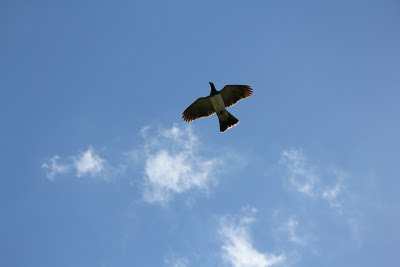 Person's eye view of kereru in flight
Person's eye view of kereru in flight
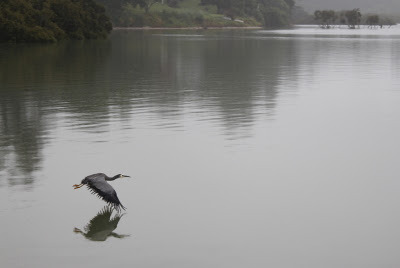 White-faced heron, Pahi, Kaipara Harbour
White-faced heron, Pahi, Kaipara Harbour
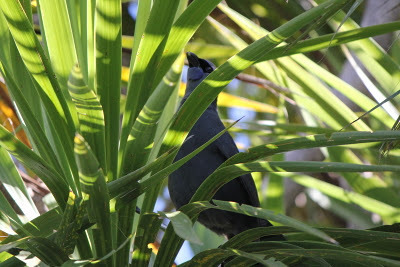 Kokako #1, Tiritiri Matangi
Kokako #1, Tiritiri Matangi
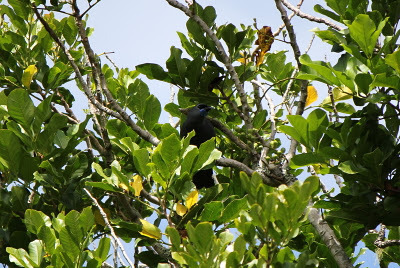 Kokako #2
Kokako #2
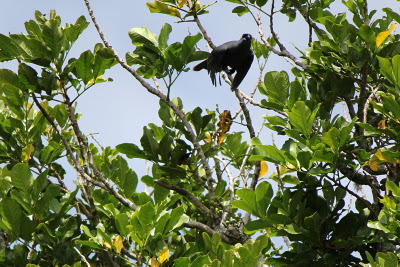 Kokako #2 in flight
Kokako #2 in flight
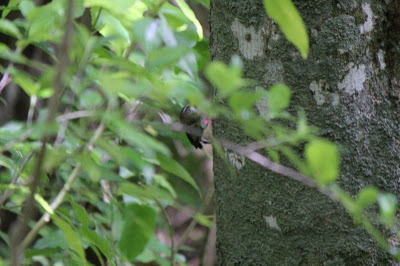 Rifleman, a.k.a. Difficult Buggers to Photograph Well
Rifleman, a.k.a. Difficult Buggers to Photograph Well
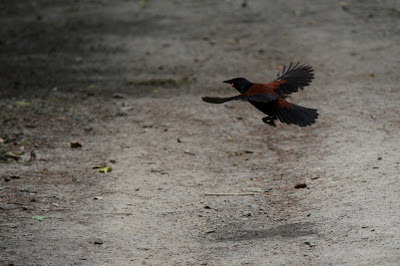 Saddleback in flight
Saddleback in flight
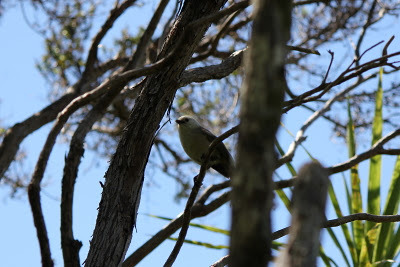 Whitehead
Whitehead
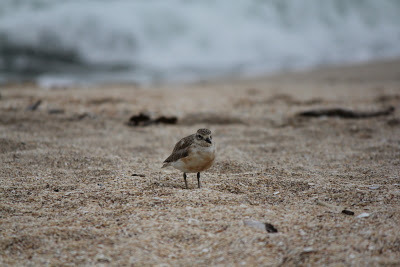 NZ dotterel, Front Beach, Coromandel
NZ dotterel, Front Beach, Coromandel
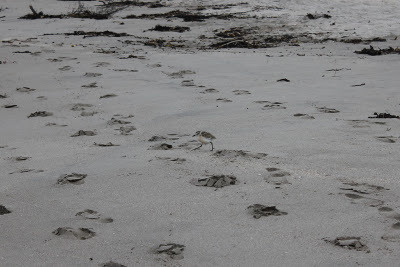 Dotterel chick, Cooks Beach
Dotterel chick, Cooks Beach
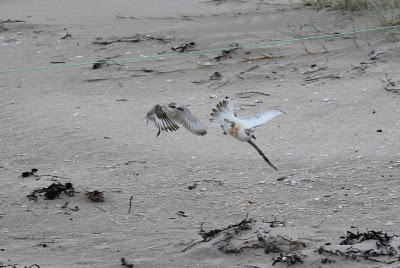 Male dotterels in territory dispute, Cooks Beach
Male dotterels in territory dispute, Cooks Beach
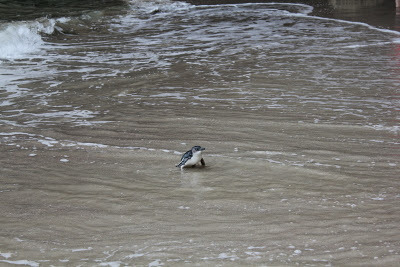 Blue penguin at Cathedral Cove
Blue penguin at Cathedral Cove
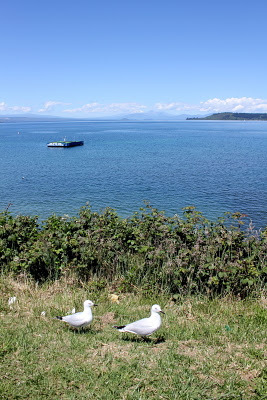 Black-billed gulls, Taupo
Black-billed gulls, Taupo

Over 3,000 kilometres later, here I am back in Wellington, back at my PC. I'm not quite clear of the Otherwise-committed Woods (got to visit family in Chch in a few days), so THE NOVEL will have to idle for a little longer. But here are some photos from my honeymoon...
 Person's eye view of kereru in flight
Person's eye view of kereru in flight
 White-faced heron, Pahi, Kaipara Harbour
White-faced heron, Pahi, Kaipara Harbour
 Kokako #1, Tiritiri Matangi
Kokako #1, Tiritiri Matangi
 Kokako #2
Kokako #2
 Kokako #2 in flight
Kokako #2 in flight
 Rifleman, a.k.a. Difficult Buggers to Photograph Well
Rifleman, a.k.a. Difficult Buggers to Photograph Well
 Saddleback in flight
Saddleback in flight
 Whitehead
Whitehead
 NZ dotterel, Front Beach, Coromandel
NZ dotterel, Front Beach, Coromandel
 Dotterel chick, Cooks Beach
Dotterel chick, Cooks Beach
 Male dotterels in territory dispute, Cooks Beach
Male dotterels in territory dispute, Cooks Beach
 Blue penguin at Cathedral Cove
Blue penguin at Cathedral Cove
 Black-billed gulls, Taupo
Black-billed gulls, Taupo
Published on December 28, 2011 13:57
November 20, 2011
Barnes v Trapido / Conductor / Offshore whore / Lockout poetry
Recent reading
I recently finished listening to Barbara Trapido's novel Sex and Stravinsky on my iPod and quickly followed this up with Julian Barnes' The Sense of an Ending, which won the Booker Prize this year.
 Trapido's novel clocked in at a normal 11 hours and change, while Barnes' was over half the time. It was a nice feeling to finish two books in quick succession after two and a bit months of listening to Nicholas Nickleby (however much I enjoyed that book).
Trapido's novel clocked in at a normal 11 hours and change, while Barnes' was over half the time. It was a nice feeling to finish two books in quick succession after two and a bit months of listening to Nicholas Nickleby (however much I enjoyed that book).
The Sense of an Ending worked magnificently as an audiobook. There's a single narrator, Tony Webster, who recalls specific moments in his life relating to a particular strand of memory: those relating to his friend, Adrian, who committed suicide in his early twenties. Tony weaves in and out of memory, digressing often on just what memory is and how it changes with time, but also finds the time to muse about the modern world, retirement, divorce and self-delusion. This is the kind of novel some agents might describe as quiet or slow, if you were to query them as a no-name writer, but I found it a thrilling and engaging story – thrilling, I guess, because it felt so intimate and real.
 Sex and Stravinsky on the other hand, was not as well suited to the audiobook format. Trapido's third person narrator inhabits at least eight different character's perspective during the novel, and while the third person is kept up throughout, the voice of the narrator often transmutes into the perspective character's voice (especially when we're following the two adolescent girl characters). I found this mix of third and first person techniques confusing in an audiobook, as the narrator adopted the voice of the difficult teenage girl while still referring to the girl as Kat/her/she. Also, the reader, Jan Francis, had the difficult task of managing English, Australian, South African (three sorts: English settler, Afrikaner and Zulu), French and Italian accents.
Sex and Stravinsky on the other hand, was not as well suited to the audiobook format. Trapido's third person narrator inhabits at least eight different character's perspective during the novel, and while the third person is kept up throughout, the voice of the narrator often transmutes into the perspective character's voice (especially when we're following the two adolescent girl characters). I found this mix of third and first person techniques confusing in an audiobook, as the narrator adopted the voice of the difficult teenage girl while still referring to the girl as Kat/her/she. Also, the reader, Jan Francis, had the difficult task of managing English, Australian, South African (three sorts: English settler, Afrikaner and Zulu), French and Italian accents.
The most engaging part of the novel for me were the parts about Caroline's mother, who ranks up there with Mrs Nickleby in the pantheon of aggravating mothers in fiction. Unfortunately, after Caroline's mother dies (to the delight of the reader), Francis's voice for Caroline alters and becomes a bit too similar to her shrewish mother. This is no fault of Trapido, of course, but it is difficult to think about the text objectively without thinking about the slips and tangles in the audiobook version.
Having said this, I'm still a big advocate of audiobooks. In my experience there are far more successes (like Barnes' and Dickens' novels) that problem children.
Still a paperboy
 The paper book I'm reading at the moment is The Conductor by Sarah Quigley. I'm about halfway and have to say I haven't really been sucked in just yet. Perhaps it's the musical chairs the narrative plays with it's three perspective characters (of which only Shostakovich was known to be beforehand). Perhaps it's the fact I'm saving the CD recording of The Leningrad Symphony until the point it appears in the story. Perhaps it's that I'm not really in the reading headspace all that often at the moment with all the wedding guff that crowds out my leisure time?
The paper book I'm reading at the moment is The Conductor by Sarah Quigley. I'm about halfway and have to say I haven't really been sucked in just yet. Perhaps it's the musical chairs the narrative plays with it's three perspective characters (of which only Shostakovich was known to be beforehand). Perhaps it's the fact I'm saving the CD recording of The Leningrad Symphony until the point it appears in the story. Perhaps it's that I'm not really in the reading headspace all that often at the moment with all the wedding guff that crowds out my leisure time?
For completists
Last month I blogged about the bad review I received (belatedly). I also wrote a column about it for the Dom Post but it wasn't posted online (there's no real logic I can see to what is and what isn't posted on www.stuff.co.nz). I include a scan of it here for posterities sake.

Common ground
You've got just over a week left to submit your short story for the Commonwealth Short Story Competition, for which I am one of the judges.
For those who've submitted or are still thinking about it, I wrote something about my experience with prizes for the Commonwealth Writers website: basically, don't just enter competitions, revise your stories, submit to journals, get better, get published. Simple, eh?
I also wrote about my favourite bricks and mortar bookshop, Unity Books on Willis Street, for which I expect at least a high five next time I come a'browsing!
Offshore whore
I spoke to Julie Green of the Griffith REVIEW about my story, 'Offshore service', and my time spent in Queensland. You can read the interview here.
Side-effects of the NBA lockout
It looks like the chances of an NBA season this year are slim to none. This is terrible news for arena staff in the states and some lower level employees of the teams who rely on basketball games for a paycheck. Spare a thought also for the basketball journalists, who have had to stake out bargaining sessions between the players and the owners which have stretched into the wee small hours (and inevitablty end with both sides unwilling to make detailed comments at the ensuing press conference as negotiation is still ongoing).
Some writers are turning their attentions to other basketball leagues around the world (where a small number of NBA players are also looking to supplement their incomes). They appear heavily reliant on Google Translate to file their updates – today Yahoo Sports' Adrian Wojnarowski tweeted that the Houston Rocket's Marcin Gortat had signed with a Turkish team, then hastily tweeted a retraction that the two parties were in fact still negotiating and the confusion stemmed from Google Translate.
Much more exciting to me was the news from SB Nation blogger Tom Ziller (@teamziller) that when you throw a Chinese box score into Google Translate it tells you there is a statistical category "was invaded" ('turnovers' to you and me). Ziller also points to a headline which translates as "Yi Jianlian floating in the sky watching JR violence of his four years of a button changes."
I'm feeling a James Brown- (NZ poet not US soul singer) style poem coming on.
Novel update
I heard back from my editor last week after she read the first c.50,000 words of THE NOVEL. She referred to it as the embryo of my novel, which might be another way of putting it. Anyway, she liked it (it would be unfair to quote embryonic praise as there's a lot that can go wrong between now and the final manuscript) and I am to push on and finish the beasty but it looks like it won't come out till February 2013. This means I'll only get to publish one book in my twenties. Oh well. It does give me a few extra months next year to really make it the best book I can. And to write some short stories and find them homes before the birth of THE NOVEL. And find a friggin' title.
I recently finished listening to Barbara Trapido's novel Sex and Stravinsky on my iPod and quickly followed this up with Julian Barnes' The Sense of an Ending, which won the Booker Prize this year.
 Trapido's novel clocked in at a normal 11 hours and change, while Barnes' was over half the time. It was a nice feeling to finish two books in quick succession after two and a bit months of listening to Nicholas Nickleby (however much I enjoyed that book).
Trapido's novel clocked in at a normal 11 hours and change, while Barnes' was over half the time. It was a nice feeling to finish two books in quick succession after two and a bit months of listening to Nicholas Nickleby (however much I enjoyed that book).The Sense of an Ending worked magnificently as an audiobook. There's a single narrator, Tony Webster, who recalls specific moments in his life relating to a particular strand of memory: those relating to his friend, Adrian, who committed suicide in his early twenties. Tony weaves in and out of memory, digressing often on just what memory is and how it changes with time, but also finds the time to muse about the modern world, retirement, divorce and self-delusion. This is the kind of novel some agents might describe as quiet or slow, if you were to query them as a no-name writer, but I found it a thrilling and engaging story – thrilling, I guess, because it felt so intimate and real.
 Sex and Stravinsky on the other hand, was not as well suited to the audiobook format. Trapido's third person narrator inhabits at least eight different character's perspective during the novel, and while the third person is kept up throughout, the voice of the narrator often transmutes into the perspective character's voice (especially when we're following the two adolescent girl characters). I found this mix of third and first person techniques confusing in an audiobook, as the narrator adopted the voice of the difficult teenage girl while still referring to the girl as Kat/her/she. Also, the reader, Jan Francis, had the difficult task of managing English, Australian, South African (three sorts: English settler, Afrikaner and Zulu), French and Italian accents.
Sex and Stravinsky on the other hand, was not as well suited to the audiobook format. Trapido's third person narrator inhabits at least eight different character's perspective during the novel, and while the third person is kept up throughout, the voice of the narrator often transmutes into the perspective character's voice (especially when we're following the two adolescent girl characters). I found this mix of third and first person techniques confusing in an audiobook, as the narrator adopted the voice of the difficult teenage girl while still referring to the girl as Kat/her/she. Also, the reader, Jan Francis, had the difficult task of managing English, Australian, South African (three sorts: English settler, Afrikaner and Zulu), French and Italian accents.The most engaging part of the novel for me were the parts about Caroline's mother, who ranks up there with Mrs Nickleby in the pantheon of aggravating mothers in fiction. Unfortunately, after Caroline's mother dies (to the delight of the reader), Francis's voice for Caroline alters and becomes a bit too similar to her shrewish mother. This is no fault of Trapido, of course, but it is difficult to think about the text objectively without thinking about the slips and tangles in the audiobook version.
Having said this, I'm still a big advocate of audiobooks. In my experience there are far more successes (like Barnes' and Dickens' novels) that problem children.
Still a paperboy
 The paper book I'm reading at the moment is The Conductor by Sarah Quigley. I'm about halfway and have to say I haven't really been sucked in just yet. Perhaps it's the musical chairs the narrative plays with it's three perspective characters (of which only Shostakovich was known to be beforehand). Perhaps it's the fact I'm saving the CD recording of The Leningrad Symphony until the point it appears in the story. Perhaps it's that I'm not really in the reading headspace all that often at the moment with all the wedding guff that crowds out my leisure time?
The paper book I'm reading at the moment is The Conductor by Sarah Quigley. I'm about halfway and have to say I haven't really been sucked in just yet. Perhaps it's the musical chairs the narrative plays with it's three perspective characters (of which only Shostakovich was known to be beforehand). Perhaps it's the fact I'm saving the CD recording of The Leningrad Symphony until the point it appears in the story. Perhaps it's that I'm not really in the reading headspace all that often at the moment with all the wedding guff that crowds out my leisure time? For completists
Last month I blogged about the bad review I received (belatedly). I also wrote a column about it for the Dom Post but it wasn't posted online (there's no real logic I can see to what is and what isn't posted on www.stuff.co.nz). I include a scan of it here for posterities sake.

Common ground
You've got just over a week left to submit your short story for the Commonwealth Short Story Competition, for which I am one of the judges.
For those who've submitted or are still thinking about it, I wrote something about my experience with prizes for the Commonwealth Writers website: basically, don't just enter competitions, revise your stories, submit to journals, get better, get published. Simple, eh?
I also wrote about my favourite bricks and mortar bookshop, Unity Books on Willis Street, for which I expect at least a high five next time I come a'browsing!
Offshore whore
I spoke to Julie Green of the Griffith REVIEW about my story, 'Offshore service', and my time spent in Queensland. You can read the interview here.
Side-effects of the NBA lockout
It looks like the chances of an NBA season this year are slim to none. This is terrible news for arena staff in the states and some lower level employees of the teams who rely on basketball games for a paycheck. Spare a thought also for the basketball journalists, who have had to stake out bargaining sessions between the players and the owners which have stretched into the wee small hours (and inevitablty end with both sides unwilling to make detailed comments at the ensuing press conference as negotiation is still ongoing).
Some writers are turning their attentions to other basketball leagues around the world (where a small number of NBA players are also looking to supplement their incomes). They appear heavily reliant on Google Translate to file their updates – today Yahoo Sports' Adrian Wojnarowski tweeted that the Houston Rocket's Marcin Gortat had signed with a Turkish team, then hastily tweeted a retraction that the two parties were in fact still negotiating and the confusion stemmed from Google Translate.
Much more exciting to me was the news from SB Nation blogger Tom Ziller (@teamziller) that when you throw a Chinese box score into Google Translate it tells you there is a statistical category "was invaded" ('turnovers' to you and me). Ziller also points to a headline which translates as "Yi Jianlian floating in the sky watching JR violence of his four years of a button changes."
I'm feeling a James Brown- (NZ poet not US soul singer) style poem coming on.
Novel update
I heard back from my editor last week after she read the first c.50,000 words of THE NOVEL. She referred to it as the embryo of my novel, which might be another way of putting it. Anyway, she liked it (it would be unfair to quote embryonic praise as there's a lot that can go wrong between now and the final manuscript) and I am to push on and finish the beasty but it looks like it won't come out till February 2013. This means I'll only get to publish one book in my twenties. Oh well. It does give me a few extra months next year to really make it the best book I can. And to write some short stories and find them homes before the birth of THE NOVEL. And find a friggin' title.
Published on November 20, 2011 17:25



